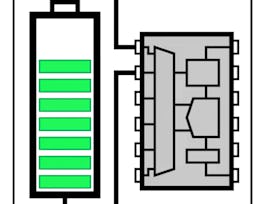Renewable energy is one of the fastest growing industries on the planet, with billions of dollars invested each year to meet international energy sustainability goals. This course will provide you with a solid foundation for understanding and deploying important renewable energy technologies such as wind and solar. In addition, you will come away with a good understanding of important energy storage technologies such as pumped hydro, batteries, and hydrogen.



Renewable Energy Technology Fundamentals
This course is part of Renewable Energy Specialization

Instructor: Stephen R. Lawrence
Sponsored by Coursera for Reliance Family
32,581 already enrolled
(630 reviews)
Recommended experience
What you'll learn
You will understand the key physical characteristics of renewable energy and electricity
You will have the knowledge to assess the advantages and disadvantages of wind, solar, and other important renewable energy technologies.
You will be able to evaluate and recommend alternative renewable energy storage technologies.
Skills you'll gain
- Environmental Issue
- Key Performance Indicators (KPIs)
- Physical Science
- Environment and Resource Management
- Environmental Resource Management
- Performance Measurement
- Electrical and Computer Engineering
- Performance Management
- Natural Resource Management
- Environmental Policy
- Physics
- Systems Of Measurement
- Electrical Engineering
- Basic Electrical Systems
Details to know

Add to your LinkedIn profile
5 assignments
See how employees at top companies are mastering in-demand skills

Build your subject-matter expertise
- Learn new concepts from industry experts
- Gain a foundational understanding of a subject or tool
- Develop job-relevant skills with hands-on projects
- Earn a shareable career certificate


Earn a career certificate
Add this credential to your LinkedIn profile, resume, or CV
Share it on social media and in your performance review

There are 5 modules in this course
Any understanding of renewable energy requires vocabulary, principles, and tools – that is the objective of this week’s module. We first define “energy.” What is it? Where does it come from? How is it measured? What are its rules? We then turn our attention to electricity and ask similar questions. What is electricity? How is it measured? How can renewable resources be used to generate electricity? Upon completion of this module, you will have a solid grounding in the underlying concepts required to understand the promise and challenges of renewable energy technologies.
What's included
10 videos10 readings1 assignment
This week we turn to wind energy – currently the most rapidly growing global source of renewable energy. First, we investigate how do winds arise? What are the important characteristics of wind? And how much energy is embodied in wind? We then describe how wind turbines extract energy from wind, and detail the components, performance, and economics of wind turbines. Along the way we pay close attention to rapidly evolving offshore wind technologies and their use.
What's included
11 videos8 readings1 assignment1 discussion prompt
Solar radiation is the most abundant source of renewable energy on earth. Given this abundance, how can it be transformed for human use? In this module we investigate several ways to turn sunlight into electricity. We first describe the attributes of solar radiation and the various ways that sunlight is useful for humans. Next, we introduce photovoltaic (PV) technologies, and how they are used to generate abundant electricity. We conclude with an examination of solar PV project applications, planning, and economics.
What's included
9 videos6 readings1 assignment1 discussion prompt
While wind and solar are the fastest growing renewable energy technologies globally, hydroelectric power remains the largest, and other technologies also have long histories. In this final module, we first describe six of these technologies, including hydropower, biomass energy, concentrating solar power, geothermal power, and ocean energy. Since effective and economic energy storage is critically important for the long-term success of renewable energy, we next turn to energy storage technologies, including pumped hydro, batteries, thermal storage, and hydrogen storage, plus several emerging storage technologies. We conclude with forecasts for the success of both renewable energy generating technologies, and renewable energy storage technologies.
What's included
15 videos5 readings1 assignment1 discussion prompt
The last week of Renewable Energy Technology Fundamentals includes a final exam that will allow you to demonstrate your mastery of the content covered in this course. Take some time to study, review any concepts or topics you found challenging, and then take the final exam!
What's included
1 assignment
Instructor

Offered by
Why people choose Coursera for their career




Learner reviews
630 reviews
- 5 stars
81.35%
- 4 stars
15.79%
- 3 stars
2.05%
- 2 stars
0.63%
- 1 star
0.15%
Showing 3 of 630
Reviewed on May 3, 2022
The course was a great introduction, but some multiple-choice test answers are incorrect (I triple-checked and cross-referenced the answers with the course material to confirm).
Reviewed on Nov 19, 2024
The course is educative and open my eye to the basic knowledge of Renewable energy. I love to take part in other course
Reviewed on Aug 1, 2022
I did not get any feedback in the opinions given in certain parts of the courses.
Recommended if you're interested in Physical Science and Engineering

Dartmouth College

Politecnico di Milano

University of Colorado Boulder

Macquarie University

Open new doors with Coursera Plus
Unlimited access to 10,000+ world-class courses, hands-on projects, and job-ready certificate programs - all included in your subscription
Advance your career with an online degree
Earn a degree from world-class universities - 100% online
Join over 3,400 global companies that choose Coursera for Business
Upskill your employees to excel in the digital economy


